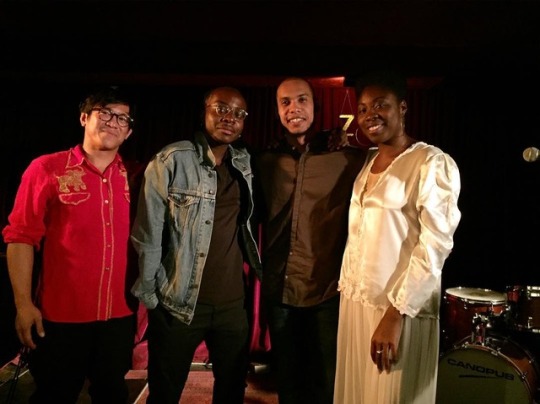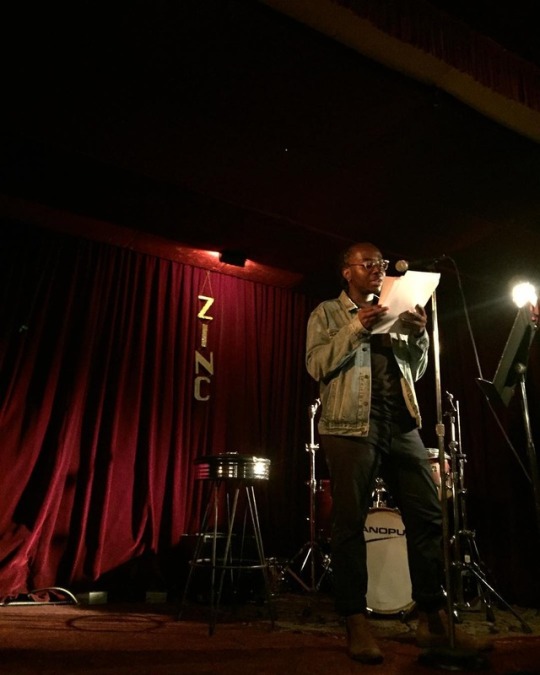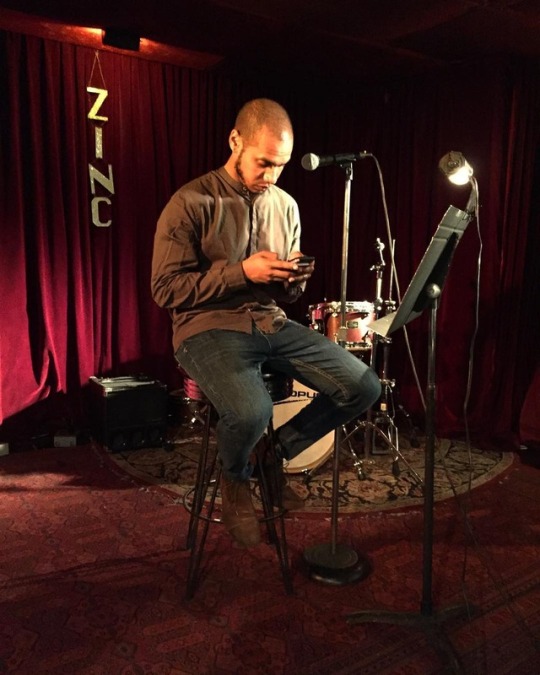#cheswayo mphanza
Text

Cheswayo Mphanza, “Frame Six” found in the Paris Review, issue 234
Alt ID:
These days I wake in the used light of someone’s spent life.
I am often a stranger to myself;
I have no place of origin, no home.
I keep remembering everything in two time zones at once.
Who knows, maybe I myself am called something other than myself.
Not so much a name, but the result of a name.
It’s a strange sensation to yell out: This is me!
In every place I’ve watched caravans of sorrow—
I run like all the other men, chasing my shadow down alleys.
Sometimes in the spaces, there is fear—
my mind deepens into them.
From calm to fear my mind moves, then moves—
in light part nightmare and part vision fleeing.
The voice rises on a storm of grackles, then returns—half elegy, half serenade.
#words#cheswayo mphanza#paris review#litblr#poetry#quotes#poets#poem#literature#paris review poetry#poems#poetry collection#mine#poets on tumblr#on the self#on losing oneself#becoming a stranger#loneliness
7 notes
·
View notes
Text

The Next Generation special issue of Open Country Mag profiles 16 writers and curators who have influenced African literary culture in the last five years.
First row (L-R): Cheswayo Mphanza, Suyi Davies Okungbowa by Manuel Ruiz, Keletso Mopai, Nnamdi Ehirim.
Second row: Tobi Eyinade by Tolu Akinyemi (Poetolu), Remy Ngamije by Namafu Amutse, Nana Nkweti by Shea Sadulski/Out of Focus Studio, Romeo Oriogun.
Third row: Gbenga Adesina by Ladan Osman, Letlhogonolo Mogkoroane and Alma-Nalisha Cele, Troy Onyango by Jagero, Oghenechovwe Donald Ekpeki. Fourth row: Ebenezer Agu, Gaamangwe Joy Mogami, Logan February, Khadija Abdalla Bajaber by TJ Benson.
0 notes
Text
Frame Six
by Cheswayo Mphanza
These days I wake in the used light of someone’s spent life.
I am often a stranger to myself;
I have no place of origin, no home.
I keep remembering everything in two time zones at once.
Who knows, maybe I myself am called something other than myself.
Not so much a name, but the result of a name.
It’s a strange sensation to yell out: This is me!
In every place I’ve watched caravans of sorrow—
I run like all the other men, chasing my shadow down alleys.
Sometimes in the spaces, there is fear—
my mind deepens into them.
From calm to fear my mind moves, then moves—
in light part nightmare and part vision fleeing.
The voice rises on a storm of grackles, then returns—half elegy, half serenade.
#melancholia shaped stuff#warm melancholia shaped stuff#poetry#cheswayo mphanza#frame six#the paris review#autumn#autumn 2021
5 notes
·
View notes
Text
Frame Six – Cheswayo Mphanza
These days I wake in the used light of someone’s spent life.
I am often a stranger to myself;
I have no place of origin, no home.
I keep remembering everything in two time zones at once.
Who knows, maybe I myself am called something other than myself.
Not so much a name, but the result of a name.
It’s a strange sensation to yell out: This is me!
In every place I’ve watched caravans of sorrow—
I run like all the other men, chasing my shadow down alleys.
Sometimes in the spaces, there is fear—
my mind deepens into them.
From calm to fear my mind moves, then moves—
in light part nightmare and part vision fleeing.
The voice rises on a storm of grackles, then returns—half elegy, half serenade.
0 notes
Text
3 Poems from Sillerman-shortlisted El Habib Louai
3 Poems from Sillerman-shortlisted El Habib Louai
Moroccan poet Elhabib Louai’s Rotten Wounds Embalmed with Tar was shortlisted for this year’s Sillerman First Book Prize for African Poetry:

The other two finalists were Egyptian-American Hazem Fahmy, for Id, and Nigerian author O-Jeremiah Agbaakin for The Root of the Word Babble is Babel. The prize went to Zambian-born poet Cheswayo Mphanza for his manuscript The Rinehart Frames.
Louai is both…
View On WordPress
0 notes
Text
Cheswayo Mphanza is Sillerman First Book Prize for African Poetry 2020 winner.
Cheswayo Mphanza is Sillerman First Book Prize for African Poetry 2020 winner.
Cheswayo Mphanza was announced the winner of the Sillerman First Book Prize for African Poetry 2020 on February 1, 2020.
The Sillerman First Book Prize for African Poetry is awarded annually to an African poet who has not yet published a full collection of poetry. The prize, named after benefactors Laura and Robert F. X. Sillerman, gives prize money of USD $1000 to the winner. They also get their…
View On WordPress
0 notes
Text
‘The Underground Railroad’ by Colson Whitehead wins 2017 Hurston/Wright award for fiction
New Post has been published on http://usnewsaggregator.com/the-underground-railroad-by-colson-whitehead-wins-2017-hurstonwright-award-for-fiction/
‘The Underground Railroad’ by Colson Whitehead wins 2017 Hurston/Wright award for fiction
Novelist Colson Whitehead won the 2017 Zora Neale Hurston/Richard Wright Legacy Fiction Award for “The Underground Railroad,” a novel that documents the life of a 15-year-old enslaved girl named Cora who escapes from a cotton plantation in Georgia, where life is hell. With a slave-catcher hunting her, she makes a harrowing flight north in search of freedom, traveling on a literal underground railroad made up of secret tracks, tunnels, engineers and conductors.
The Hurston/Wright judges described “The Underground Railroad,” which also won the 2017 Pulitzer Prize for Fiction, the National Book Award and the Carnegie Medal for Fiction, as a book of “remarkable craft and imagination.”
[Book World Review: The Underground Railroad ]
His award was among those presented Friday by the Zora Neale Hurston/ Richard Wright Foundation, which was founded in Washington in 1990 with a mission to ensure the survival of black writers and literature by black writers.
Whitehead’s attention to the pain of slavery and “the current state of race in this country is unprecedented,” the judges said. The novel, which was a New York Times Bestseller, “confirms Whitehead’s place in the African American canon” of great authors.
Carla Hayden (Matt McClain/The Washington Post)
The Washington Plaza hotel in Northwest Washington was bustling Friday with literary stars, publishing icons, writers, poets, editors and essayists. More than 200 people attended the annual gala, including Rep. John Lewis (D-Ga.), who won the Ella Baker Award that honors writers and arts activists who advance social justice.
Carla Hayden, who made history in 2016 when she became the first woman and first black person sworn in as Librarian of Congress, was presented with the North Star Award. Poet Haki Madhubuti won the Madam C.J. Walker Award, which honors exceptional innovation in sustaining black literature.
The 2017 award for nonfiction went to “Hannah Mary Tabbs and the Disembodied Torso: A Tale of Race, Sex, and Violence in America,” by Kali Nicole Gross. The book focuses on a “whodunit” murder case in 1887 Philadelphia, after a beheaded torso was discovered in a pond. The mysterious torso defied race, appearing neither white nor black. Gross researched detectives’ notes and trial transcripts to unravel the story of Hannah Mary Tabbs, a black woman who refused to live within the confines of stereotypes.
“Dubbed a ‘murderess,’ Tabbs and the torso case would be front-page news for months because it unearthed otherwise forbidden subjects such as adultery, sex and domestic violence,” Gross wrote. “The victim was thought to be her lover, but Tabbs blamed an 18-year-old mixed-race teenager named George Wilson for the crime. Their fates became intertwined within the brutally racist criminal justice system of the time.”
The Legacy Award for Debut Fiction went to “Damnificados,” by JJ Amaworo Wilson, who the judges said created a “fabulist and gritty dystopia that is nearly allegorical in its portrayal of the dispossessed.”
The award for poetry went to “Bestiary,” by Donika Kelly, whose “plain-spoken way of proceeding is a guise for sharp truths that leave readers wounded,” the judges said.
“What beast// will your blade free next?” Kelly wrote. “What call will you loose/ from another woman’s throat?”
The Award for College Writers went to: Shakarean Hutchinson, an MFA student at Cornell University, who won the fiction prize for her story “How to Kill Pigs.”
Cheswayo Gabriel Mphanza, an MFA student at Rutgers University, won the poetry prize for his collection of “3 Poems.”
Finalists in the fiction category were: “The Loss of All Lost Things,” by Amina Gautier and “Another Brooklyn,” by Jacqueline Woodson.
Nonfiction finalists were: “The Social Life of DNA: Race, Reparations, And Reconciliation After the Genome,” by Alondra Nelson and “The Wake: On Blackness and Being,” by Christina Sharpe.
Poetry finalists were: Francine J. Harris for “play dead” and Phillip B. Williams who wrote “Thief in the Interior.”
Original Article:
Click here
0 notes
Photo

Segue co-curators with Akeema-Zane & Cheswayo Mphanza 10/14/17 http://ift.tt/2icDu9Q
0 notes
Photo

Cheswayo Mphanza 10/14/17 @cheswayo • • • #poetry #poems #Segue #SegueReadingSeries #CheswayoMphanza #ZincBar #poetryreading #NYCevents http://ift.tt/2yq1GLF
0 notes
Photo

We’re ready for you 🎤 💗 Co-curator Joël Díaz testing the sound for today’s reading with AKEEMA-ZANE + CHESWAYO MPHANZA 💕 #poetry #poems #Segue #SegueReadingSeries #AkeemaZane #CheswayoMphanza #ZincBar #poetryreading #NYCevents http://ift.tt/2wVYUup
0 notes